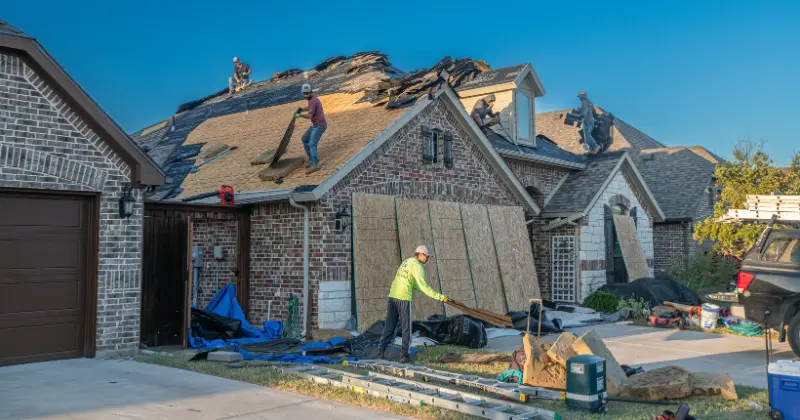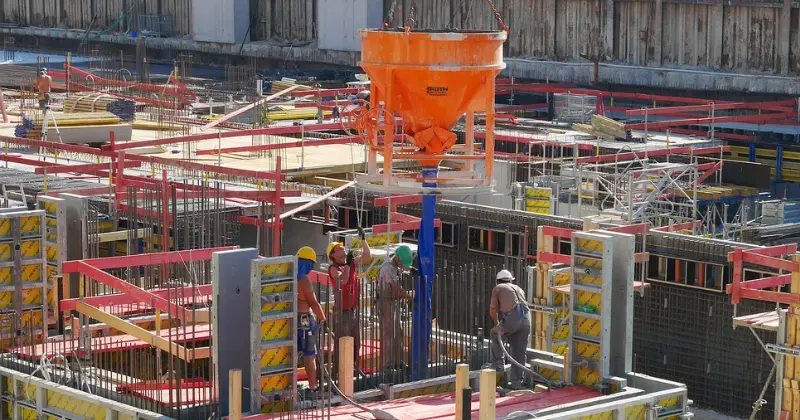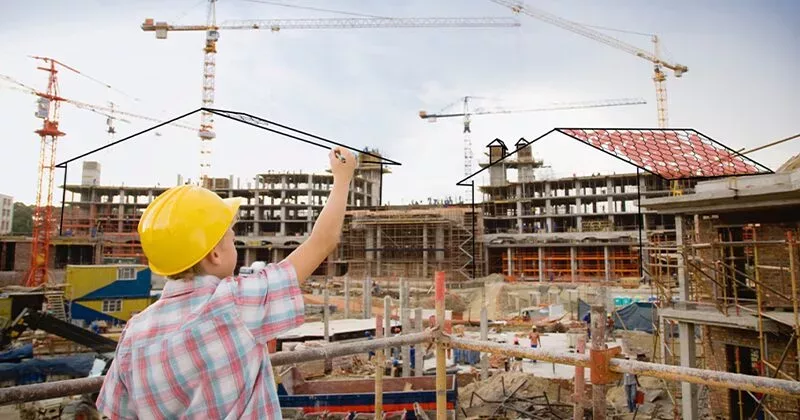11 mins read
Construction Specifier: A Detailed Outline of the Role

At RIB Software, we are not only committed to developing innovative construction software solutions, but we also want to educate our users and readers about the ins and outs of our industry. As a part of this mission, we put together a blog series that explores the different construction roles, outlining the essential skills, responsibilities, potential salary, challenges, and educational path of each. In previous editions, we covered the roles of the construction estimator, construction planner, and BIM manager. Today, it is the turn of the construction specifier.
Construction specifications are crucial documents prepared before construction begins that guide the building team and other stakeholders about how the project should be built. They provide details about how the different materials and equipment should be used and the workforce guidelines. Their main goal is to provide detailed information to complement what is shown in the design and ensure the project’s quality and regulatory requirements are met.
Construction architects often want to handle the spec generation process. However, as skilled as these professionals might be, they must be equipped with the technical and regulatory knowledge required to clearly specify project requirements. This can lead to incomplete or unclear information, resulting in multiple change orders, budget overruns, and schedule delays. That is why the role of the specifier is so important today. These professionals are experts in the field and are equipped to advise in decision-making for better outcomes. Keep reading to learn everything about it!
What is a Construction Specifier?
A construction specifier is a professional responsible for generating detailed technical specifications about a project’s materials and equipment. They advise project stakeholders about what materials to acquire to meet design, quality, safety, and sustainability requirements.
Specifiers are professionals with a wealth of knowledge in construction, product manufacturing, installation, and maintenance. They are experts in all types of construction materials and methods, making them invaluable assets in building cost-effective but high-quality structures.
Project specifiers are especially important in large construction projects, where different teams design components that must fit together for the project to work. Specifiers can review and integrate all these elements in an understandable and technically accurate way. They collaborate with stakeholders, like architects, engineers, contractors, and clients, to outline detailed specifications to guide the project.
Construction Specifier vs Spec Writer
When discussing this role, it is always debated whether a specifier is the same as a spec writer. The answer is that it depends. Like many other concepts in the construction industry, the definitions change from company to company and from project to project. Some say specifiers are senior consultants across the entire project, offering advice about materials and product selections to all disciplines, and define spec writers as solely responsible for the spec writing process, following the guidelines of the design team or the specifier. Others consider these two roles as one, as the specifier has the technical expertise to write specs clearly and concisely.
For this post, we will treat the construction specifier and spec writer in the same role, providing an overview of the professional responsible for managing and creating construction specifications.
What Does a Construction Specifier Do?

Carefully study project requirements
Specifiers need to carefully study project requirements to develop clear specifications and provide effective advice and feedback. They collaborate with the design team to pick materials and technologies that align with the quality and regulatory requirements. They must also apply this knowledge throughout the project to evaluate the work and ensure quality.
Develop specifications
As mentioned previously, writing specifications is one of the key tasks associated with this role. Specifications must be detailed, specific, and clear, as different teams, especially contractors and subcontractors, will use them as guides for their work. Specs are also utilized during quality inspections to ensure the work complies with the agreed requirements. Specifiers collaborate with architects, engineers, and other disciplines at this stage to produce the most accurate and detailed specs. It is important to note that in large construction companies, the specifier can be considered a senior position that is not in charge of the actual writing of specs; for that, they hire a spec writer. However, as mentioned earlier, for the purpose of this post, we are considering the role as a whole.
Support the procurement process
The construction specifier is very important and supports the construction procurement process. They research and evaluate materials regarding durability, performance, costs, and environmental impact and advise the procurement team about the best ones to purchase. They also assist in the construction bidding process by preparing the specifications in the tender package and helping compare the different bids to select the most appropriate ones for the project.
Manage specifications throughout the project
The role of a construction specifier goes beyond selecting materials and advising building methods; the responsibilities of a modern specifier expand throughout the project’s lifecycle. They review and challenge the decisions of the different stakeholders to ensure quality, safety, health, and building requirements are met while keeping the project time and cost-effective. If a change of any nature happens during the project, specifiers must update the documentation and the different teams to ensure everyone remains on the same page.
Key Construction Specifier Skills

As you just learned, specifiers are crucial to communicating project requirements accurately and clearly. They are expert advisors about the quality and usability of different materials, equipment, and construction methods, helping the project remain more time and cost-efficient. To do these tasks successfully, these professionals must possess various skills, which we’ll explore below.
- Industry knowledge: To advise clients on selecting materials, equipment, and other items, specifiers must possess deep industry knowledge. They must understand the benefits and disadvantages of different materials and construction methods depending on the project context and stay updated about future innovations.
- Regulatory knowledge: Paired with industry knowledge, these professionals must have a deep understanding and awareness of regulatory requirements in the industry. One of the main benefits of specifications is that they ensure all aspects of the project comply with building codes and safety and environmental regulations, making regulatory awareness a must for this role.
- Attention to detail: Given the importance and length of specifications and the need for every detail to be clear, concise, and accurate, construction specifiers must pay great attention to detail. During their work, they review important documents, such as drawings, bill of quantities, and more, to ensure the information is correct. If any details are missed, it can cost the project a lot of money.
- Communication: Specifiers must have effective communication skills to translate project requirements, which are often technical, into a simple and clear format that is understandable for all stakeholders, regardless of their technical background. They must also be able to clearly communicate their advice and potential solutions, outlining benefits and implementation strategies.
- Problem-solving: Specifiers will often encounter issues such as design discrepancies, material availability, or non-compliance with regulations. To solve these problems successfully, they must possess strong problem-solving skills to analyze situations, identify their reasons, and implement strategies to solve them and keep the client happy.
How Much Can You Earn as a Specifier?
Like all the other roles we have covered in this blog series, a construction specifier’s salary will depend on a number of factors, including the type of project, the region, the qualifications, and much more. However, there is an average salary these professionals can expect to make if they meet the basic requirements. To this date, the average yearly salary in the US is $85,523 and £38,730 ($51,989) for the UK.
How to Become a Construction Specifier?
The path to becoming a construction specifier mixes education, training, and experience. The educational path starts with a bachelor’s degree in a relevant field, such as architecture, construction management, or engineering, lasting two to four years. Around the third year of your degree, you can start applying for internships or apprenticeships at an architectural firm or construction company, where you can start drafting specifications and learning about materials, equipment, regulations, and all the ins and outs of the field. You can also apply to other jobs like a helper in an architectural firm, a construction laborer, or a manufacturing supplier company, as these will also help you gain the necessary skills and knowledge to dive into the role.
Once you have graduated, you can start applying for jobs in the field. However, it is important to note that due to the skills and experience requirements of the position, you might have to start with a smaller role and build your experience until you become a recognized construction specifier. Most companies ask for at least eight to ten years of experience due to the complexity of the role.
You can apply for additional certifications to differentiate yourself from other candidates. One of the most recognized certifications for specifiers in the US is the Certified Construction Specifier (CCS) program offered by the Construction Specifications Institute (CSI). The course was first introduced in the 1980s and has provided an avenue for specifiers to achieve excellence. In the UK, specifiers can apply for a range of certifications, including becoming a Chartered Architectural Technologist (MCIAT) or getting a Construction Skills Certification Scheme (CSCS), to prove their knowledge in design and construction.
What Challenges Do Construction Specifiers Face

Construction specifiers face common challenges in their daily operations like any other profession. Awareness of these challenges can help spot and prepare to tackle them early. Using modern specifier software is fundamental to automating different processes, preventing issues and errors, and boosting outcomes. Let’s explore some of these challenges below!
- Keeping up with regulations: The construction industry is constantly changing, with new regulations and technologies emerging regularly. Keeping up with all these changes can be challenging for specifiers, as they must spend much time researching. However, professionals following this career path must be committed to continuous learning and professional development. Otherwise, they will not stand out from competitors.
- Managing changes and revisions: Changes like design modifications or unavailable materials are unavoidable in construction projects. Managing these changes, updating specifications, and communicating the changes to all stakeholders to avoid conflicts can present a challenge for specifiers. Supporting themselves with the right construction collaboration software to manage and communicate crucial information is key.
- Balancing cost and quality: As expert consultants, specifiers might face the challenge of providing cost-effective solutions that keep the client happy while maintaining quality. To do so successfully, they must use their expertise to find the best way to balance cost and quality while informing the client about the benefits of each choice.
- Managing time effectively: In many cases, construction specifiers work on multiple projects simultaneously. This makes it challenging to manage the time to meet project deadlines while ensuring that specifications are as detailed and clear as possible. Professional specifications software helps to automate several processes, leaving specifiers enough time to
- Ensuring effective communication: Clear and concise communication is crucial for effective specifications. Translating all the project requirements in an understandable and clear manner is not easy, as many technical concepts are involved. Plus, they risk writing ambiguously, which can also lead to misunderstandings and costly reworks. To overcome this challenge, specifiers should emphasize specificity and clarity. They can also support themselves with templates and tools that streamline the writing process.
What Software Do Construction Specifiers Use?
Specifiers rely on various software solutions and technologies to tackle the abovementioned challenges and optimize daily operations. Below, we discuss the most common ones.
Construction Specifications Software
Specialized construction specification software is the most valuable tool used by these professionals. These solutions automate several tasks in the specifications process, making it easier to have a single source of truth for the project.
A prime example of these solutions is RIB SpecLink, our cloud-based specifications software that helps construction companies centralize and optimize spec management.
Our powerful platform can be fully integrated with Revit BIM software to connect specifications to 3D models and identify conflicts and considerations in real-time to drive better outcomes. The different project stakeholders can work simultaneously, tracking changes and leaving comments for seamless collaboration and coordination. Additionally, RIB SpecLink has an extensive database of products and over 1,000 content sections that significantly reduce the research time, making spec writing way more efficient.
Cost Estimation Software
While not directly responsible for performing cost estimating, specifiers can benefit from construction estimating software due to the accurate information these solutions provide. They automate calculations and provide agile and accurate estimations about the costs of materials and labor, which are fundamental for accurate specifications. Plus, the flexibility provided by these solutions allows for agile updating of estimates, budgets, and specs in the event of changes or variations.
An amazing example of these tools is RIB CostX, our professional cost estimation software with built-in BIM takeoff capabilities for increased intelligence and accuracy.
The platform offers a range of powerful functionalities that take estimating to the next level. For example, users can live-link estimates to design documents and track the impact of changes to find the best mitigation strategies. All relevant data extracted from the process can be visualized in highly customizable reports to support strategic decision-making.
Document Management Software
As mentioned in the post, construction specifiers are more than just advisors. They are responsible for drafting and updating specifications and other documents to ensure clarity about contractual obligations and the project’s quality requirements. To do so, they support themselves with professional construction document management software. These solutions provide a centralized location for all documentation, avoiding version control issues.
Final Thoughts
Construction specifiers are experienced professionals who use their extensive knowledge to help the project reach its quality goals. They learn and review every detail, identifying areas for improvement and then suggesting innovative and cost-effective solutions. They are experts on all things related to construction materials and can provide sound advice about which material is best based on the project’s requirements. They are also responsible for drafting the specifications to capture all the requirements in an understandable and applicable way, contributing to a collaborative environment that increases productivity.
To do this efficiently, these professionals must support themselves with innovative construction specifications software like RIB SpecLink, which automates the process and generates a single source of truth for the project. If you are ready to experience state-of-the-art spec technology, get a free demo for RIB SpecLink today!

Most Recent
11 mins read
10 mins read
10 mins read
29 mins read
Blog Categories

Ebook











